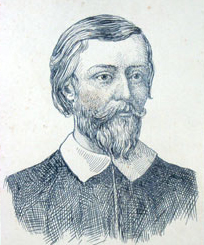Gregório de Matos
Gregório de Matos , also Gregório de Mattos Guerra (born December 20, 1623 in Salvador da Bahia , Brazil , † October 19, 1696 in Recife , Brazil), was an important Brazilian poet and lawyer. He is regarded as the founder of an independent Luso-Brazilian literature, as the most important poet in Brazil of the Baroque and its epoch and as one of the most important Baroque poets of the Portuguese language.
Life
Matos was born the third son of a nobleman. He spent his childhood and youth on his father's fazenda , where he had to help because the older brothers were away from home. First he studied at the Jesuit seminary in Salvador da Bahia, before going to Portugal around 1650 , where he studied law in Coimbra until 1661 . He then worked as a judge in Alcácer do Sal in the Alentejo from 1663 and also briefly in Lisbon . In 1672 he was appointed representative of the province of Salvador at the Portuguese court. In 1678 he returned to Brazil. There he criticized the conditions in the country and was deported to Angola in 1694 , where he was involved in a revolt of mutinous soldiers. In 1695 he returned to Bahia , where he served as the financial administrator of the Archbishop of Salvador until his death.
He was married twice, and in 1691 he married for the last time. He was friends with the poet Tomás Pinto Brandão (1664–1743). His younger brother was the painter Eusebio de Matos (1629–1692).
Poetry
Gregório de Matos is still the most important poet in Brazil. He was nicknamed “Boca do inferno” (Hell's mouth) because of his biting and satirical poems. The range of topics ranged from religious and moral to erotic and pornographic poems. His work was not published during his lifetime and for a long time afterwards. It was not until the beginning of the 20th century that his works were summarized in various editions. As a critic, he was not afraid to criticize everything and everyone: the state, church and society. All professions and races, all classes, from the richest to the poorest, were affected by his satirical-critical poetry. He saw his role models in the warring Spanish poets Luis de Góngora and Francisco de Quevedo . Many of his poems were sonnets .
plant
- Sacra (Holy) Volume 1, Poetry, 1923.
- Lirica (Lyric), Volume 2, Lyric, 1923.
- Graciosa (Compassionate), Volume 3, Poetry, 1930.
- Satirica (Satirical), Issues 4 and 5, Poetry, 1930.
- Ultima (The Last), Volume 5, Poetry, 1930.
translation
- Gregorio de Matos: Selected Poems, Portuguese-German. ELA edition Latin America, 1992.
swell
- http://fdcl-berlin.de/?id=726
- http://www.poemhunter.com/gregorio-de-matos-guerra/
- http://www.bridica.com/EBchecked/topic/369455/Gregorio-de-Matos-Guerra
- http://thefiendish.com/2010/02/gregorio-de-matos-the-religiously-perverse-poet/
- http://educacao.uol.com.br/biografias/gregorio-de-matos.jhtm
Web links
- Literature by and about Gregório de Matos in the catalog of the German National Library
- Literature by and about Gregório de Matos in the catalog of the Ibero-American Institute of Prussian Cultural Heritage, Berlin
| personal data | |
|---|---|
| SURNAME | Matos, Gregório de |
| ALTERNATIVE NAMES | Matos, Gregorio de; Mattos Guerra, Gregorio de |
| BRIEF DESCRIPTION | Brazilian poet and lawyer |
| DATE OF BIRTH | December 20, 1623 |
| PLACE OF BIRTH | Salvador da Bahia , Brazil |
| DATE OF DEATH | October 19, 1696 |
| Place of death | Recife , Brazil |
